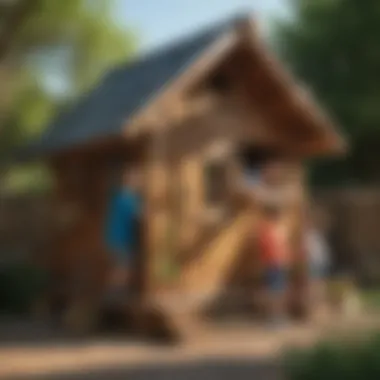Expert Guide: How to Construct a Wooden Playhouse for Kids


Playhouse Overview
When considering how to build a wooden playhouse as a comprehensive guide for parents and educators, it is essential to first understand the different types available. Playhouses come in various sizes, styles, and designs, ranging from simple structures to elaborate mini-houses, each offering unique benefits for children's play.
Features and Benefits
As we delve into constructing a wooden playhouse, it's crucial to highlight key features and benefits that make these play spaces invaluable for kids. From durability that ensures longevity to safety measures to provide a secure environment, and the imaginative stimulation they offer, wooden playhouses contribute significantly to a child's holistic development.
Buying Guide
In the pursuit of building the perfect wooden playhouse for kids, there are key factors to consider. These encompass the material used, determining the playhouse's size based on available space, choosing a theme that aligns with children's preferences, and incorporating interactive elements to enhance play experiences.
Maintenance Tips


Maintaining a wooden playhouse is vital to extend its lifespan and ensure continued safety and enjoyment. Providing cleaning instructions to keep the playhouse pristine, along with storage recommendations to protect it from weather elements when not in use, are essential tips for parents and educators to uphold playhouse longevity.
Customization Options
When exploring the realm of wooden playhouses, the world of customization opens up a realm of possibilities. From paint-your-own playhouse kits that foster artistic expression in children to DIY playhouse kits that promote family bonding through building, and the option to build a playhouse from scratch for personalized designs, there are unique avenues for creating a tailored play space. Additionally, incorporating unique playhouse accessories further enhances the play area, elevating the overall play experience.
Introduction
Building a wooden playhouse holds immense significance in cultivating a space where young minds can thrive. In this article, we will delve into the intricate process of constructing a wooden playhouse, tailored to cater to the needs of both parents and educators. By following the step-by-step guidance provided, readers can create a safe and stimulating environment that promotes creativity, outdoor play, and overall child development.
Understanding the Importance of Playhouses
Benefits of Playhouses for Child Development


Playhouses serve as more than just structures; they act as catalysts for fostering essential skills in children. Through imaginative play, children develop cognitive abilities, social skills, and emotional intelligence. By engaging in pretend play scenarios within the confines of a playhouse, children enhance their problem-solving skills and creativity, laying a solid foundation for their future growth and development.
Factors to Consider Before Building a Playhouse
Before embarking on the construction journey, several key factors merit careful consideration. Factors such as selecting the appropriate size, location, and design of the playhouse significantly impact its utility and longevity. Additionally, safety features must be prioritized to ensure that the play space is secure and conducive to a child's exploratory nature.
Tools and Materials Required
Essential Tools for Construction
Building a wooden playhouse demands a specific set of tools tailored to the task at hand. Necessary items include hammer, nails, a saw, level, measuring tape, and safety gear. These tools not only facilitate the construction process but also ensure precision and safety throughout the project.
Choosing the Right Wood for Durability


The type of wood selected for the playhouse construction directly influences its durability and longevity. Opting for quality, weather-resistant wood ensures that the playhouse withstands various outdoor elements and maintains its structural integrity over time. Consider factors such as treated lumber or cedar, known for their resilience against rot and decay.
Preparing the Site
Clearing and Leveling the Ground
Preparing the site for construction involves clearing the area of debris, rocks, and vegetation. Leveling the ground is essential to create a stable foundation for the playhouse. Adequate site preparation guarantees the structural stability and longevity of the wooden playhouse, providing a safe environment for children to play.
Ensuring Proper Drainage
Incorporating proper drainage systems helps prevent water accumulation around the playhouse, minimizing the risk of water damage and structural decay. Adequate drainage ensures that the play space remains dry and safe for children to enjoy, enhancing the lifespan of the structure.
Building the Foundation
Types of Foundations for Playhouses
The foundation of a playhouse forms the backbone of its structural integrity. Common foundation types include concrete slabs, gravel pads, or post foundations. Understanding the specific requirements of each foundation type is crucial in ensuring the stability and durability of the playhouse structure.
Securing the Base
Securing the base of the playhouse involves anchoring it to the foundation securely. Properly securing the base prevents shifting or instability, providing a safe environment for children to play and explore. This step is essential in maintaining the structural integrity of the playhouse over time.



